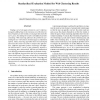Free Online Productivity Tools
i2Speak
i2Symbol
i2OCR
iTex2Img
iWeb2Print
iWeb2Shot
i2Type
iPdf2Split
iPdf2Merge
i2Bopomofo
i2Arabic
i2Style
i2Image
i2PDF
iLatex2Rtf
Sci2ools
107
click to vote
WEBI
2005
Springer
2005
Springer
Standardized Evaluation Method for Web Clustering Results
Finding a set of web pages relevant to a user’s information goal is difficult due to the enormous size of the Internet. Search engines are able to find a set of pages that match the user’s query, but refining the results is still difficult and time consuming. Web clustering addresses this problem by presenting the user with clusters of related pages as refinement options. Many clustering algorithms have been developed and researchers need to be able to compare their effectiveness. Different algorithms produce clusterings with different characteristics: coarse or fine granularity, disjoint or overlapping, flat or hierarchical. The lack of a standardized web clustering evaluation method that can evaluate clusterings with different characteristics has led to incomparable research and results. This paper solves this by introducing a new structure for defining general ideal clusterings and new measurements for evaluating clusterings with different characteristics by comparing t...
General Ideal Clustering | Internet Technology | Many Clustering Algorithms | Web Clustering Evaluation | WEBI 2005 |
Related Content
| Added | 28 Jun 2010 |
| Updated | 28 Jun 2010 |
| Type | Conference |
| Year | 2005 |
| Where | WEBI |
| Authors | Daniel Crabtree, Xiaoying Gao, Peter Andreae |
Comments (0)

